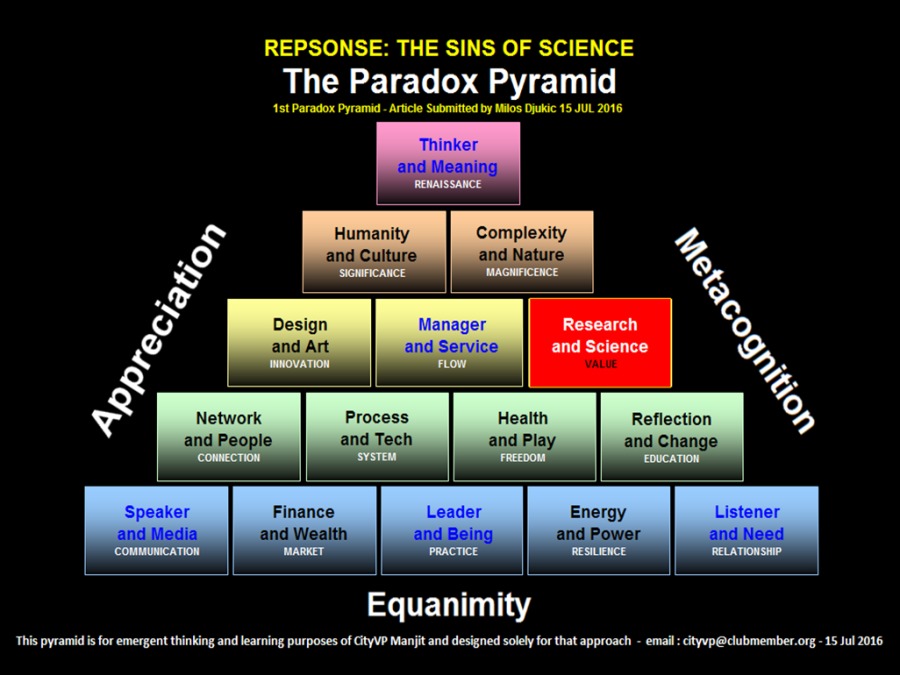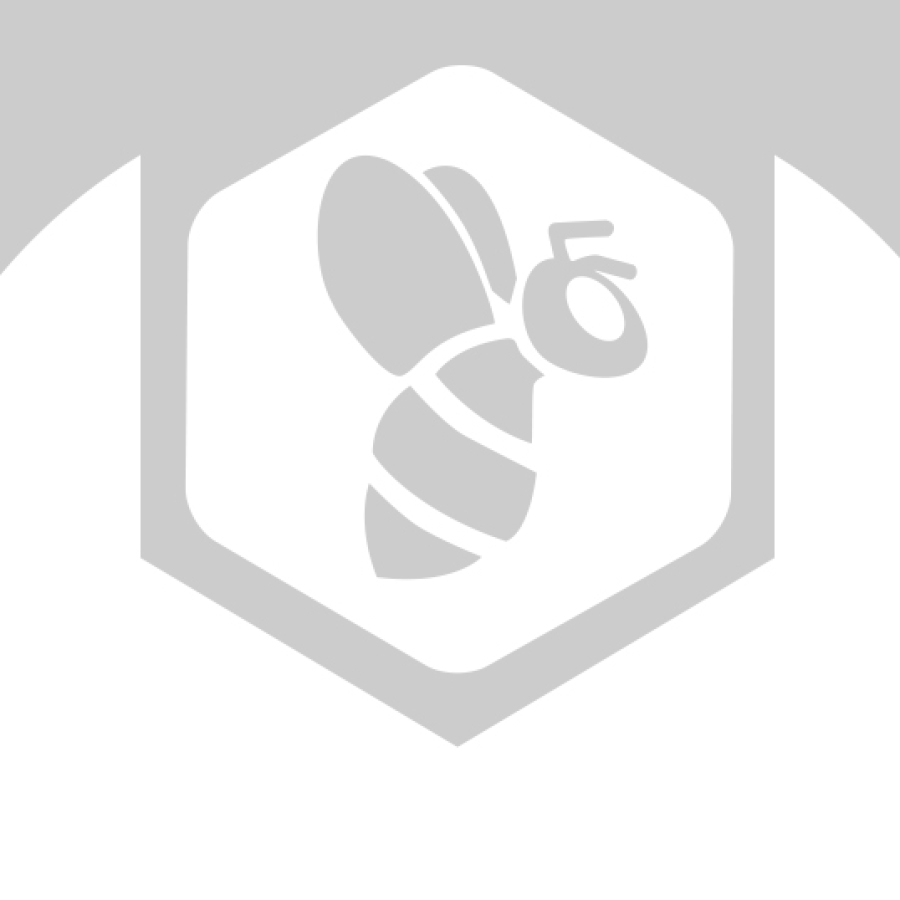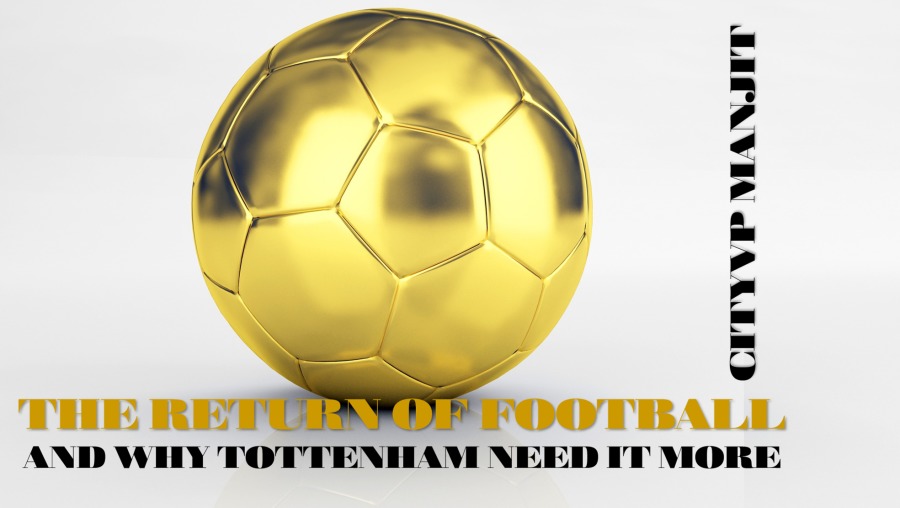The Sins of Science

Buzz Submitted by : Milos Djukic
Excellent Insights in the Vox
Article: The 7 biggest problems facing science, according to 270 scientists
Great article linked by good friend Milos and like many areas of life, science also is facing its introspective moment now that there is a wider audience open to long-form content. The superficial is still the dominant expression but our exposure to media does introduce us to quality content, if that is we are not led away by the calling of temporal entertainment.
The first thing I do with an article of this magnitude and depth is check-in on its authors:
Julia Belluz - Brian Resnick - Brad Plummer
There is value in knowing the background of the authors that add value to the insights one is reading. For instance Brad Plummer does not list a personal blog, whereas Julia Belluz utilizes it as a personal brand page but Brian Resnick chooses visuals rather than text to link to articles. It is still a landing page but demonstrates a neat way to communicate science content. From all of this I discover that the discussion I originally saw courtesy of Milos, that there is an extended article as another piece called:
We asked hundreds of scientists what they’d change about science. Here are 33 of our favorite responses.
Secondary Article about Problems in Science in The Vox
The value of this article for me goes beyond the issues involved, it is peering into the minds of actual scientists and recognize the kind of world that liberates them and the kind of world that inhibits them. This article is about the world that inhibits them. Most people are not going to read one of these long-form articles, never mind two - or even hit the link to Brian Resnick's page to discover how he creates doorways to serious articles but also shows great humour.
The first article begins with the issue of perverse incentives and rewards. These do not simply apply to science but cross all professional disciplines. If we understand how incentives corrupt good science, we should be able to understand how poor incentives corrupt, period.
Why has it taken this long for scientists to be able to look at the science of their own choices and behaviour as influenced by the environment and culture they operate or work in? This brings us to the problem of short-termism - and the first article hammers this point home but it also reveals the human being and we need to look at these issues as human effects, otherwise we don't share these learnings across but only deep dive until we reach the point of anomie. This sense of detachment and hopelessness that comes when the issue is lost in the depths.
How can we talk about success so generally as we do and as constantly as we do, but when the rubber meets the road, the uncompromising skin of reality appears. At this point even the profession that is built on evidence has lost sight of the evidence and submits to compromise and conflicts of interest, that only become apparent in the cold hard truth of providing daylight.
The easiest solution is to do what works and recognize the quality of what works, but simplicity is confounded by people who assert the solution and here Marshall McLuhan's work on effects becomes more poignant - and shows me how many knots we tie, simply trying to untie knots. His four effects (tetrads) detailed below are explained by Owen Kelly
1. What does it enhance?
2. What does it make obsolete?
3. What does it retrieve that had been obsolesced earlier?
4. What does it flip into when pushed to extremes?”
What McLuhan saw as media effects are the same effects a scientist faces when they face any change that impacts the way they make decisions and work. This means that we can keep trying to come up with fixes at the local level and still not see the big picture i.e. that we need to pull back significantly recognize that we need to place trust in leaders who can discern this.
By the time I am half way through the article I am getting an inkling that the chief problems outlined cover either
MONEY - EGO - SYSTEM - SOLUTIONS
which spells MESS.
Then I plough on because while the article addresses what is wrong with the system, the solutions it brings up are simply what has apparently worked elsewhere at some point or time, but that does not mean that it will work where we are. Only we can make that determination and then hope the system is able to trust us or create systems of trust that the majority trust.
When it comes to the pressure to publish and the detriment that causes, the article inroduces us to Brian Nosek As I personally discover who Nosek is I discover the existence of instutitions such as The Center for Open Science and the Open Science Framework In other words places that scientists can go where they can aggregate their collective thinking.
I am not going to single-handily change the entire fabric and landscape of science because I read one article, but this article is expanding my knowledge of the scientific community. Which brings me back to the same place, that the problems of one discipline or field are the problems of other disciplines and field also. What this article teaches me is the language required to communicate that commonality. All disciplines speak their own language, there is no common translation across fields until a particular issue is so pervasive, that more agree than disagree.
When the language of science meets the language of statistics I am sure even the minds of scientists glaze over but they know that this is a part of the territory. There is so much in these articles that I nearly missed the importance of statistical significance - and this is great for people who speak that language but not so good for people who feel left out. Even better is when people take to video and actually try to make all of this a little easier to understand : 
As I scour elsewhere as I read the article (and in a hyperlinked world why are we not doing that) I get to see how truly great the article that Milos buzzed about is. Yet what has made this article really great? It asked the community that is scientists and that is the same as engaging in an annual inventory check. It is not the same as engaging perpetual inventory, but that is the reason why social media needs to be an exploration rather than a publication.
I for one am exploring this, I am not saying that this is how the world is - and when we all begin exploring, we stop showing each other what the world is and start listening to those who actually work in that world and who responded to well designed research and questions. That is quite ironic in the context of the article - publication does not equal good science.
The article also introduces me to Michael Inzlicht but only to his academic page and not to his blog which is called "Getting Better" for this is where Inzlicht gets more personal and I would rather take an objective view of the personal, rather than a subjective view of the academic. It simple re-iterates that even if there is great undiagnosed trouble in the world of science, it has plenty of great minds to bring vision rather than point solutions and stop-gap improvements.
As I explored the links I realized that I could not get to all the links but I was now on the look out for that which makes my heart beat a little faster - and when I found Alltrials it certainly did : 
The article was piling in more names but the gist of these names was underlining the existence of bad science and when there is enough bad science around, the one thing I know is that comedians will have surely picked that up - so instead of seeing more of the links mentioned, I turned to comedy-central host John Oliver, who discusses Bad Science and that is that for me. 
Articles from CityVP Manjit
View blog
The Paradox Wisdom Collection: Poetic Clipboard [Paradox #46] · Reference: Ali Anani Post :A Wrong ...

For the record I was born in 1961. · For the record Barack Obama was born in 1961. · For the record ...

If the season is decided today by a co-efficient performance based on points per games played, Spurs ...
You may be interested in these jobs
-
Transit Driver
Found in: Talent CA C2 - 5 days ago
PWTransit Canada Spruce Grove, Canada Part timeTransit Driver · Location: Spruce Grove, AB · Do you prefer being behind-the-wheel instead of stuck at a desk all day? Do you enjoy providing a service to your community? This may be the opportunity for you PWTransit is currently seeking part-time and casual Transit Drivers to ...
-

Nanny
Found in: beBee S2 CA - 3 weeks ago
CanadianNanny Outremont, Canada Part timeWe are two professionals with 2 mature teen/preteen kids and a cute dog needing mostly light help around the house part-time or full-time. We are looking for a reliable and detail-oriented person to help maintain our home and assist with various chores in Outremont, Quebec. Ideal ...
-
Drug Access Navigator Prescription Care Centre
Found in: beBee S2 CA - 3 days ago
St Michael's hospital Toronto, Canada Full timeDrug Access Navigator Prescription Care Centre (Job ID: 4157) · The primary role of the Drug Access Navigator is to assist patients in the Oncology Clinic (Medical Day Care - St. Michael's Hospital site) to obtain access to medications that are required as part of their treatment ...


Comments
CityVP Manjit
7 years ago #4
CityVP Manjit
7 years ago #3
Yes! Totally adaptive, totally emergent. I look forward to seeing how this pyramid looks after it has been processed via many articles. The chief benefit here is that I can now go to exhaustive lengths exploring what is essentially a massive comment. For years I loved the idea of the blog being in the comment section, now I get to explore comments in the blog (buzz) section. You have it spot on in your comment "never limit thinking" and more importantly I must understand where it is I may have.
CityVP Manjit
7 years ago #2
This pyramid will change continuously as I try to describe the content I am accessing and the hierarchical component is 100% play. The base which says Equanimity is simply a frame. Before the frame was Intelligence, so I look for potential meaning and not actual meaning. This is simply playing with chaotic ideas and iteratively moving pieces like a jigsaw - never representing a final picture, but creating an hierarchy of own focus. The spine is important though for that represents Leader, Manager, Thinker - and that itself is an inversion of the typical pyramid that has leader on top. So this is a playful construct, and with each article I explore, the construct will change. It is not saying humanity & culture is more important than design & art, simply my current state positioning of it, which is arbitrary. It is a plaything for my own exploration - helps me think.
CityVP Manjit
7 years ago #1
This pyramid will change continuously as I try to describe the content I am accessing and the hierarchical component is 100% play.T